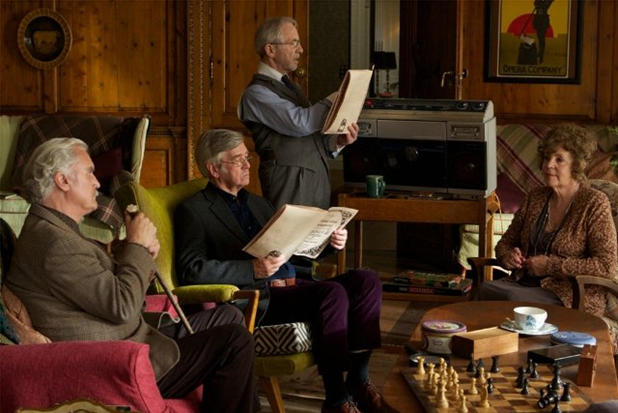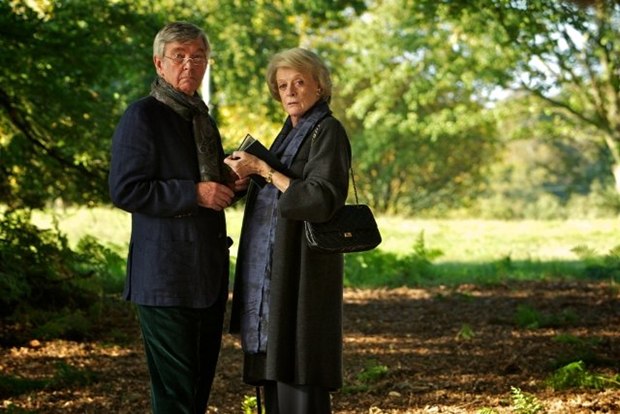Quartet
reviewed by Scotty Barnhart
During “A Critical Eye on Film: the Cinema Studies Perspective,” the 2012 Savannah Film Festival panel hosted by the Savannah College of Art and Design’s Cinema Studies program, panelists discussed the relationships between narrative, spectacle, and the short attention spans of pubescent males. In short, they reaffirmed that Hollywood produces tentpole movies for teenage boys. However, Hollywood recently re-embraced the Baby Boomer, who, now retired with expendable time and money, “is turning out to be the most avid moviegoer of all.”[1] A recent article in The Hollywood Reporter details how Boomers are fashioning hits from low budget fares like The Best Exotic Marigold Hotel (2012)—a movie produced for only $10 million that returned $46 million domestically and $131 internationally—and Moonrise Kingdom (2012), which, until The Master (2012), had been the most successful limited release of all-time.
Hollywood previously embraced the Boomer during the mid-1960s, “when Bonnie and Clyde and The Graduate were gestating” and “studios were still in the rigor-mortis-like grip of the [out of touch] generation that invented the movies.”[2] Filmmakers were “frozen in the ice of ’50s conformity,” and box-office numbers tumbled to all-time lows.[3] History repeats itself. The MPAA reported that all attendance demographics fell in 2011, except for Boomers. Hollywood must compete with television and meticulously-developed dramas like Mad Men and Downton Abbey. Additionally, “teenagers and young adults” are disappearing “behind video game consoles, computers and iPhones.”[4] At 25, I’m frequently the youngest movie attendee by two generations. Yet the Savannah Film Festival audience’s enthusiastic response to Dustin Hoffman’s directorial debut Quartet (2012) indicates, perhaps, another sign of a Boomer resurgence. With Savannah’s 1150-seat Trustees Theater filled with Boomers, the fourth night of the festival closed with an aged audience awarding Quartet not one, but two extended rounds of applause.
Adapted by Ronald Harwood from his same-titled play, and based on the documentary Il Bacio di Tosca (1984), Quartet stars Maggie Smith, Tom Courtenay, Pauline Collins, and Billy Connolly as the eponymous quartet of retired opera singers. Now living at Beecham House, a bankrupt retirement home for gifted musicians (based on Milan’s Casa di Riposo per Musicisti), they reunite to perform a benefit gala for Beecham, celebrating both Verdi’s birthday and their own resilience to mortality. During this finale concert, audiences briefly behold a montage of former opera stars performing trademark routines. According to Hoffman, Quartet is about “people who can still do it, but nobody calls them.”[5] And art imitates reality since “the people in this film, who make up the musicians, the real retired musicians and opera singers, their phone hadn’t rung in 20 years.”[6]
Along with another Savannah Film Festival selection, Michael Haneke’s Amour (2012), Quartet represents another meditation on growing old—but within the entertainment industry. In fact, Quartet‘s most poignant moment occurs as Reginald (Courtenay) stares out across the autumnal grounds of Beecham at sunset, contemplating his own mortality and the return of his ex-wife, Jean (Smith). Hoffman’s camera then rotates from Reginald to directly face the sunset. The moment suggests the quartet’s future: their light’s almost out, but for now, they’ll shine with striking radiance. The whites, browns, and golds of Beecham’s interior—similar to those of the apartment in Amour—additionally express these golden years. Quartet, though, doesn’t exist within the same melancholic shadows of Amour and its somber, quiet realism. It also lacks the depth of performance. I fully expect Emanuelle Riva to receive at least an Oscar nomination for her performance in Amour. Though Quartet‘s performances are amusing, the cast isn’t stretched to their dramatic ends. The movie’s a small, controlled chamber debut for Hoffman. The conventional “let’s put on a show to save —” narrative extends back to the cinema’s early sound era. And each of the movie’s tightly structured three acts simply consists of Jean resisting something. The first act is propelled by her arrival at Beecham. A former diva who “never took less than twelve curtain calls,” Jean immediately perpetuates characteristics from Smith’s roles in Marigold (“I don’t want to be here, but am forced to for health reasons”) and Downton (noble resentment and a longing for the past). The second act is propelled by her refusal to rejoin the quartet, who wish to revive their interpretation of Verdi’s Rigoletto for the benefit. And until “a quartet of lights” atop Beecham fade to black at the movie’s close, the third act is propelled by whether she and Reginald will resume their relationship.
Until this third act, it’s Connolly—recently honored by the Leicester Comedy Festival as the most influential U.K. stand-up comedian of all-time—who really gives the most memorable performance. He’s perfectly cast as the lovable lecher Wilfred, who flirts with residents, nurses, and his married doctor, and tosses profanities and suggestive gestures around with seasoned dexterity. Of course, however deserved, I can’t praise him exclusively. In singling out Connolly, I’m reminded of the praiseworthy performances by both Smith and Courtenay (one of the movie’s funniest moments has Reginald interrupting a tender walk with Jean by lambasting his nurse with profanities for serving him apricot jam), as well as Collins, whose ditzy and endearing Cissy completes the quartet.
In many ways, Quartet is not Amour, but this cast performs exactly as Hoffman and the script require. Following recent Boomer-pleasers like Hope Springs (2012), where an aging couple struggles with love, and Trouble with the Curve (2012), where an aging baseball scout proves he “can still do it,” Quartet is a contained, witty meditation on growing old.
Published December 3, 2012.
Notes
Scotty Barnhart was born and raised in Elkins, West Virginia. He received his B.A. in English from Davis & Elkins College in 2009. He is currently completing his M.A. in Cinema Studies at the Savannah College of Art and Design. He is the Graduate Assistant for the Cinema Studies department, as well as Student Editor for The Cine-Files. Some of his research interests include the history of classical Hollywood, genre theory, and the life and work of Alfred Hitchcock. His master’s thesis is a close reading of The Invisible Man (1933). He resides in the suburbs of Savannah with his wife, Erin, and dog, Maxwell.


